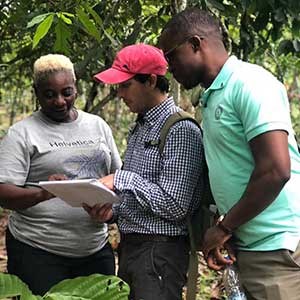Contact
mona.bonta.bergman@slu.se, 090-786 81 56

Through various collaborations involving nomadic cattle herders, small-cacao farmers, and young forest entrepreneurs and activists and researchers in different countries in Africa the Department of Forest Economics at SLU assists in combating climate change and infrastructural infringement facing millions of Africans.
Researchers at the Department of Forest Economics work extensively with issues that nomadic cattle herders, smallholder cacao farmers, and the young population in Africa face and that are aggravated by climate change. How this came to be can most likely be explained by the sincere commitment to sustainable development among these researchers and their colleagues in Africa, the Department, and SLU.
Climate change has already hit the African continent hard. Ways to manage and withstand these increasing problems are desperately needed. Here we look more closely at some research issues related to this that the Department is or has been involved in the last few years.
In West Africa, over two million households are supported by cocoa farming, and expected more severe droughts due to climate change will likely affect them profoundly. The capacity to deal with drought is limited by access to resources ranging from financial to physical assets, and many women are particularly vulnerable.
— Women are often marginalized from cocoa farm decision-making and revenues. Research needs to be gender-aware to detect and identify gender-based differences in climate resilience, says Francisco X. Aguilar who coordinates a project funded by the Swedish Research Council to expand our knowledge of the interaction between climate change impacts and gender dimensions.
Across the Horn of Africa, more than 265 million people depend on livestock; however, they are increasingly challenged by the loss of land, resource and political conflicts, increase in population, economic inequality, and climate change. Sharing experience and knowledge is important to face these issues.
— Four very popular “Livestock Cafés’” have been established, experimental sites where for instance fodder productivity can be studied, also co-learning and knowledge exchange can take place, says Göran Bostedt, who is involved in a project led by Ingrid Öborn, SLU Uppsala, looking more closely at nomadic cattle herders.
Africa has the world’s youngest population. Africa’s youngsters will be a source of transformational knowledge and action. They need to be empowered and inspired to sustainably manage African forests and support forests’ role in combating and adapting to climate change. In November 2022, young forest entrepreneurs, activists, met in Voi, Kenya with African and Swedish forest researchers and local administration representatives to discuss the youth’s views, vision, goals and ideas in shaping the future governance of Kenya’s and the continent's forests. The program contained plenary presentations, open discussions, and field visit to Ngangao forest. The event prompted co-creation of insights and a dialogue on sustainable forest management for biodiversity and improved livelihoods.!
— The workshop was inspiring. It showed that African youth can contribute to sustainable development on the continent – if they are given a fair chance, says Anders Roos who was part of the Workshop and project.
These climate change issues are best addressed through a collaborative approach. All projects engage African and SLU researchers and participants from local authorities and organizations. They are also closely attached to the people and businesses affected.
— We need multidisciplinary and inclusive views from the conception and implementation to the interpretation of research findings, if applied research is to make a meaningful contribution to sustainable development, says Francisco X. Aguilar.
Text: Department of Forest Economics
Back to Vårt SLU
mona.bonta.bergman@slu.se, 090-786 81 56